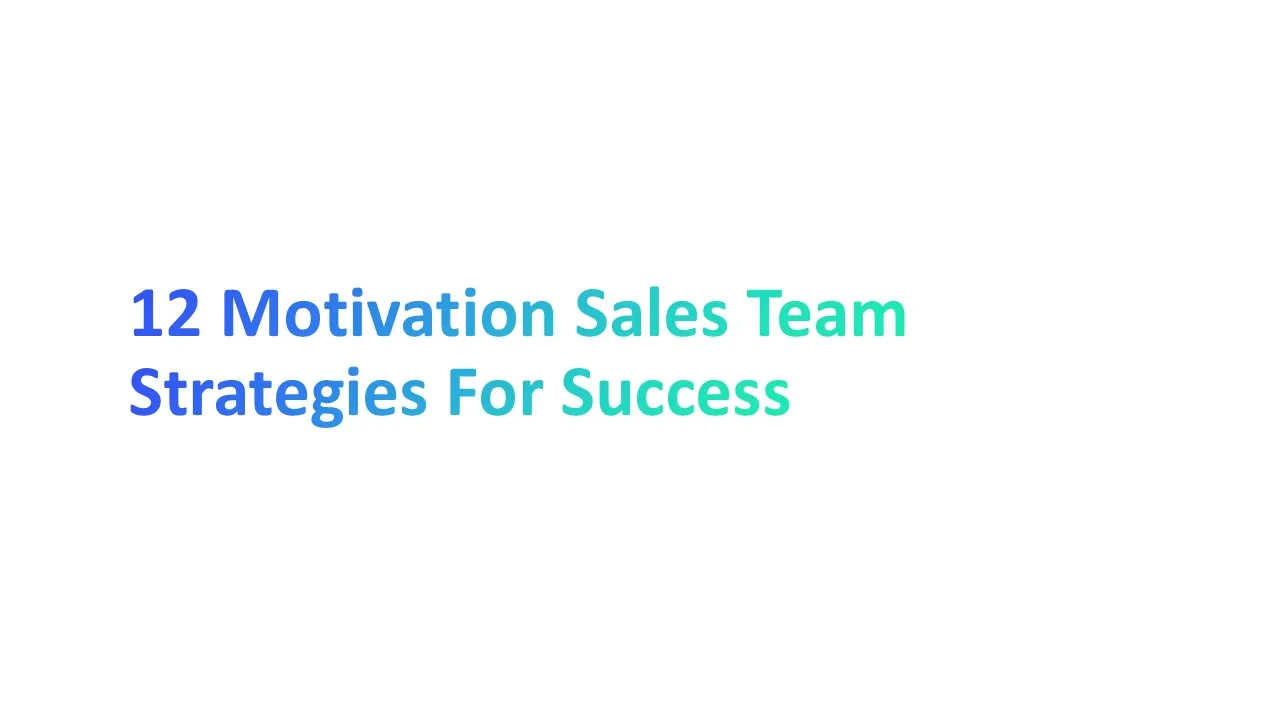Introduction to Discovery Questions in Sales

What is a Discovery Call
A discovery call serves as the initial interaction between sales professionals and potential customers, primarily focused on understanding the prospect's needs, challenges, and business context. It's a foundational component of the sales discovery process, where sales reps gather valuable insights to tailor their sales strategies effectively.
- Objective: The main goal is to qualify if the prospect is a good fit for the product or service offered.
- Approach: During the call, sales reps use discovery questions sales techniques to unearth the prospect's pain points, current solution, and purchasing process. This helps in creating a tailored sales pitch later in the sales cycle.
Why are Discovery Calls Important in the Sales Process?
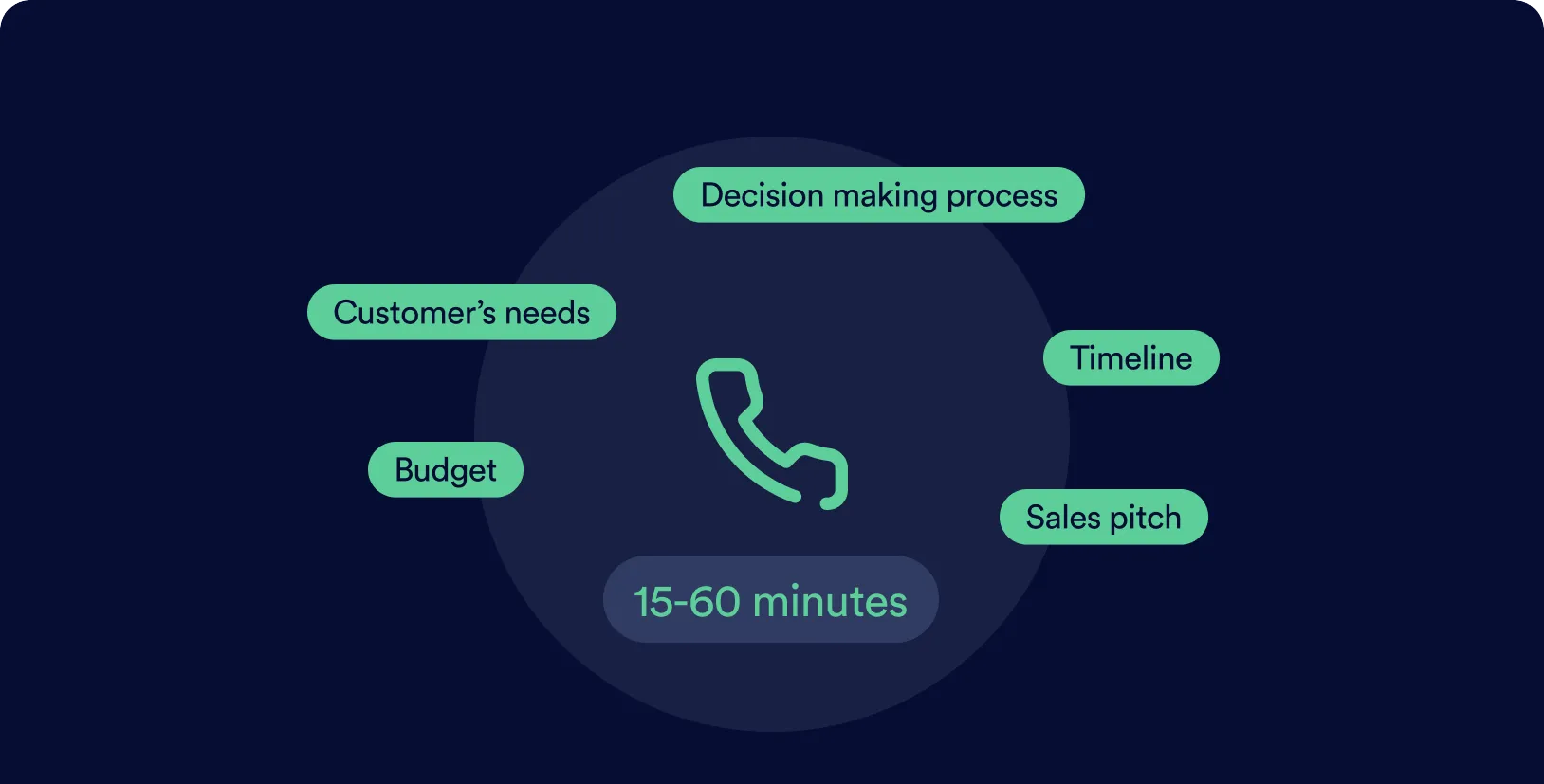
Discovery calls are crucial for streamlining the sales process and increasing the efficiency of sales efforts. They offer several key benefits:
1. Better Qualification of Leads
According to a study by HubSpot, effectively conducted discovery calls can increase lead qualification rates by up to 70%. This ensures that sales reps spend their time on leads most likely to convert.
2. Understanding Customer Needs
The insights gained from discovery questions allow sales teams to understand what exactly the prospect is looking for and how their offering can solve the prospect’s problems.
By identifying the specific needs and challenges of the prospect through targeted discovery questions sales reps can better align their product or service as the ideal solution.
3. Building Relationships
Early interactions like discovery calls set the stage for building trust and rapport, which are crucial for a successful sales process.
Effective communication during these calls helps in establishing a connection and showing genuine interest in the prospect's challenges, leading to more engaged and responsive prospects.
4. Efficiency in Sales Funnel Movement
With a clear understanding of the prospect's decision-making process and key decision makers involved, discovery calls can significantly shorten the sales cycle by moving leads through the funnel more quickly.
Information gathered during discovery calls can help sales teams refine their strategies, focusing on what works best for similar prospects in terms of follow-up questions and closing techniques.
Key Components of an Effective Sales Discovery Process
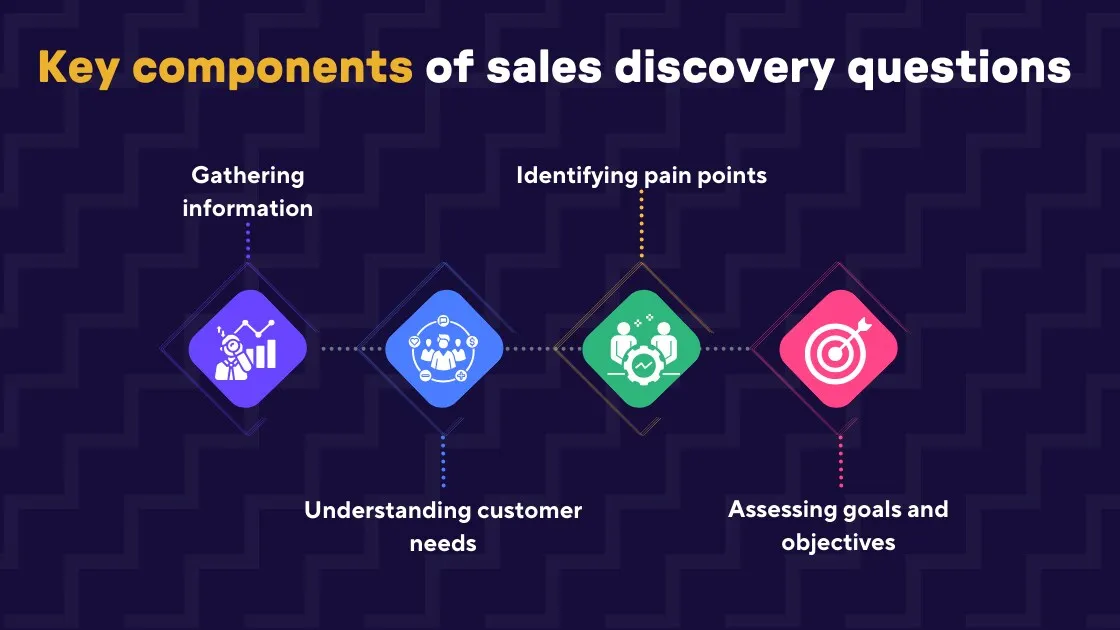
An effective sales discovery process is critical to identifying and understanding the needs, challenges, and opportunities present with each prospect. It involves a structured approach that includes several key components, each designed to enhance the potential success of subsequent sales efforts.
1. Thorough Research
Before even initiating a discovery call, sales professionals should gather comprehensive background information on the prospect and their company. This preparatory step ensures that the conversation is relevant and personalized.
- Sources of Information: Research might include reviewing the company’s website, recent press releases, and relevant industry news.
- Benefits: According to a LinkedIn report, sales reps who conduct high-level research on their prospects achieve up to 34% more successful outcomes in their sales processes.
2. Strategically Crafted Questions
The core of the discovery process is the set of questions posed during discovery calls.
- Types of Questions: These should include a mix of open-ended questions that encourage dialogue (e.g., "What challenges are you currently facing?") and specific discovery questions sales reps use to dig deeper into processes and pain points.
- Outcome: Effective questioning can lead to uncovering critical information that informs the sales strategy, aligns solutions with the prospect’s needs, and identifies potential deal breakers early on.
3. Active Listening
Engaging in active listening during discovery calls not only conveys respect and genuine interest but also provides deeper insights into the prospect's responses.
- Technique: Active listening involves acknowledging the information shared by the prospect, clarifying uncertainties, and reflecting on the key points discussed.
- Impact: This component is crucial for building trust and rapport, which are foundational for progressing through the sales cycle.
4. Documentation and Analysis
Recording and analyzing the information gathered during discovery calls is essential for refining sales strategies and preparing for follow-up actions.
- Tools and Practices: Utilizing CRM systems to log discovery questions and answers, customer pain points, and other valuable insights can help in maintaining accurate records for ongoing sales efforts.
- Application: This data is invaluable for tailoring communications, proposals, and presentations to the specific needs and pain points of the prospect, thereby increasing the likelihood of a successful sales outcome.
5. Alignment with Sales Goals
The discovery process should be aligned with broader sales goals and strategies, ensuring that every discovery call moves the prospect closer to a decision.
- Integration: Ensuring that discovery findings align with the sales discovery process and overall business objectives helps in effectively guiding the prospect through the buying process.
- Efficiency: Alignment maximizes resource utilization and improves conversion rates by focusing on the most promising opportunities.
Decision-Making Process After Sales Call
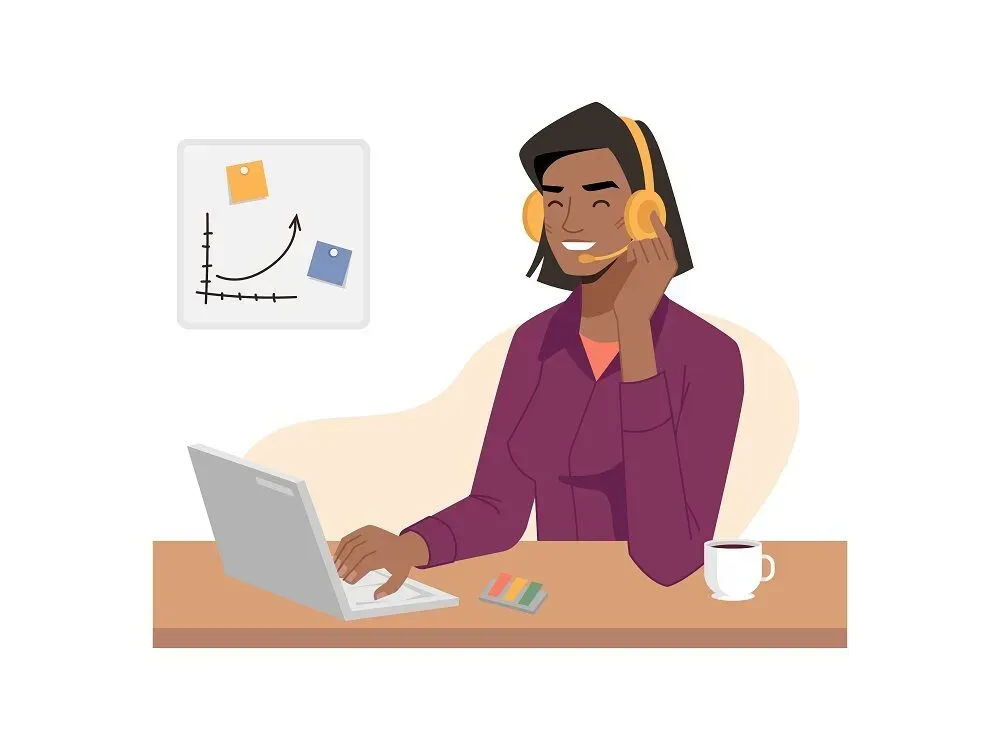
After a sales call, the decision-making process involves several crucial steps that can significantly impact the eventual outcome of the sales effort. Understanding and effectively managing this process is key for sales teams aiming to convert prospects into paying customers.
Evaluation of Prospect's Feedback:
The first step post-call is to review and evaluate the feedback provided by the prospect during the discovery call. This assessment helps in determining their interest level and readiness to proceed.
- Immediate Feedback: Capture immediate reactions of the prospect to the pitch and key discussion points.
- Longer-term Indicators: Pay attention to follow-up actions suggested by the prospect, such as requests for additional information or a second meeting.
Internal Review with Sales Team
Sales representatives should then meet internally to discuss the call’s outcomes and strategize next steps based on the gathered insights.
- Collaboration: Include insights from different team members who might have different perspectives or additional information about the prospect.
- Strategy Adjustment: Modify the sales approach based on the prospect’s feedback and the overall sales cycle progress.
Tailoring the Proposal
Based on the discovery information and the feedback from the sales call, tailor the sales proposal or presentation to better align with what the prospect needs and values.
- Customization: Highlight how the product or service specifically addresses the pain points and goals mentioned by the prospect.
- Value Proposition: Reinforce the unique benefits and competitive advantages of your offering.
Follow-Up Communication
Crucial to keeping the momentum going, timely and strategic follow-up can significantly influence the prospect's decision-making process.
- Timing and Method: Determine the most effective time and communication method for follow-up based on the prospect's preferences and your sales team’s insights.
- Content of Follow-Up: Include relevant additional information requested during the call, answer any new questions that have arisen, and gently remind the prospect of the discussed solutions and their benefits.
Addressing Objections and Concerns
If the prospect has unresolved objections or concerns, addressing these effectively is crucial for moving forward.
- Problem Solving: Provide clear, concise, and factual responses to all issues raised by the prospect to help remove barriers to the sale.
- Reassurance: Demonstrate understanding and empathy, ensuring the prospect feels heard and their concerns are being taken seriously.
Closing the Deal
If all signals are positive and the prospect is leaning towards making a purchase, prepare to close the deal.
- Confirmation: Confirm all the details and terms of the offer, ensuring both parties are in agreement.
- Closing Techniques: Utilize effective closing techniques that encourage the prospect to make a final positive decision.
Learning and Improvement
After the decision, whether positive or negative, gather learnings from the entire process to refine future sales strategies.
- Feedback Collection: Collect detailed feedback from the prospect on why they chose to move forward or not.
- Sales Process Review: Analyze the sales process to identify strengths and areas for improvement, incorporating these insights into future training and strategy sessions.
100 Sales Discovery Questions

Sales discovery questions are crucial for understanding a potential client's needs, challenges, and decision-making processes. Here are 100 questions that can be used during the sales discovery phase to better understand your prospect and tailor your pitch accordingly:
Rapport Building Questions
These questions help establish a connection and build trust between the salesperson and the prospect. They're often open-ended and casual.
- "Can you tell me a little about your journey with [Company] so far?"
- "What inspired you to get into [their industry or role]?"
- "How has your role evolved since you started with the company?"
- "What are some of the projects that you are currently excited about?"
- "What’s a recent win you had that you’re particularly proud of?"
- "Outside of work, what are some passions or hobbies that you enjoy?"
- "Looking ahead, what are some goals you have for your role or your team?"
- "What’s been the biggest challenge you’ve faced in your role, and how did you tackle it?"
Need Identification Questions
Questions in this category aim to uncover the specific needs, problems, or challenges the prospect is facing, enabling the salesperson to tailor their pitch.
- "What are the main challenges you're currently facing in your role?"
- "Can you describe a recent situation where you found your current solution lacking?"
- "What are the key goals that you are trying to achieve this quarter/year?"
- "How do you measure success for your team or department?"
- "What features or capabilities are you looking for in a solution?"
- "What does your ideal solution look like?"
- "Are there any processes within your team that you think could be more efficient?"
- "What budget constraints are you working within for this project?"
Qualifying Questions
These are used to determine if the prospect qualifies as a viable customer based on criteria such as budget, authority, need, and timeline (BANT).
- "What is your timeline for implementing a new solution?"
- "Who else on your team would be involved in the decision-making process?"
- "What is your budget for this project?"
- "Have you considered any other solutions or vendors?"
- "What are your key criteria for selecting a vendor?"
- "How urgent is your need for this solution?"
- "What would be a deal-breaker for you when selecting a solution?"
- "Can you walk me through your procurement process?"
Company Insight Questions
Focused on understanding the prospect’s business environment, goals, and industry challenges.
- "Can you describe your company’s overall strategic goals for this year?"
- "How does your department fit into the larger objectives of the organization?"
- "What are the biggest growth areas for your company right now?"
- "Who are your main competitors, and what sets your company apart from them?"
- "How has your industry been changing recently, and what new challenges has that brought?"
- "What internal or external factors are currently impacting your business the most?"
- "Can you explain how decisions are typically made within your organization?"
- "What are the long-term strategic priorities that your company is focusing on?"
Pain Point Questions
Specifically aimed at diving deeper into the challenges and difficulties the prospect experiences, which the product or service could address.
- "What are the biggest challenges you are currently facing in your role?"
- "Can you describe a recent problem that impacted your team's productivity?"
- "What aspects of your current solution or service are you finding most frustrating?"
- "Are there any tasks or processes that consume an unnecessary amount of time?"
- "What are the most frequent complaints you hear from your team about your current system?"
- "How does this problem affect your day-to-day operations?"
- "What do you wish you could change about your current workflow?"
- "How have these challenges affected your business outcomes?"
Solution Fit Questions
Questions that help both the salesperson and the prospect explore how well the proposed solutions align with the prospect’s needs and pain points.
- "How do you envision our solution fitting into your current workflow?"
- "What specific features are you looking for in a solution?"
- "Are there particular aspects of our product that you think would be most beneficial to your team?"
- "What are your expectations regarding support and training for this solution?"
- "How would the ideal implementation process look for your team?"
- "What are the critical outcomes you expect from implementing our solution?"
- "Can you describe how you see our solution addressing your key pain points?"
- "What are your long-term expectations from the solution in terms of scalability and adaptability?"
Buying Process Questions
These seek to understand the prospect’s decision-making process, including who makes the decisions and how decisions are typically reached."Can you walk me through your typical buying process from start to finish?"
- "Who are all the stakeholders involved in this purchasing decision?"
- "What steps need to be completed before you can finalize a purchase?"
- "How long does the decision-making process usually take?"
- "Are there any approval processes or sign-offs required before a purchase can be made?"
- "What criteria do you use to evaluate potential vendors and solutions?"
- "How does budget approval work for this type of purchase in your organization?"
- "Have there been any recent changes to your procurement policies or processes?"
Objection Handling Questions
Aimed at preemptively identifying potential objections and concerns that the prospect might have regarding the product or service.
- "What concerns do you have that might prevent you from moving forward with this solution?"
- "Can you help me understand what specifically is holding you back from deciding today?"
- "Are there any particular features or aspects of our offering that you feel are not meeting your expectations?"
- "What would an ideal solution need to include for you to feel comfortable making a decision?"
- "How does our solution compare with others that you are considering?"
- "Is budget the primary concern, or are there other aspects we should address?"
- "What additional information can I provide to help alleviate your concerns?"
- "If we could find a way to overcome these challenges, would you be prepared to proceed with the purchase?"
Future Vision Questions
Encourage prospects to think about how their situation could improve post-purchase, helping them visualize the benefits and positive outcomes.
- "Where do you see your company five years from now?"
- "What long-term goals are you aiming to achieve with this solution?"
- "How do you envision this product helping you scale your operations?"
- "What are the key milestones you aim to achieve in the upcoming year?"
- "How do you plan to adapt your business to changing market conditions?"
- "What future challenges do you anticipate that we could help you address?"
- "In what ways do you hope technology will improve your workflow in the future?"
- "What impact do you expect our solution to have on your long-term business success?"
Competitive Insight Questions
Questions that gauge the prospect's current or past solutions and their views on competing products or services.
- "What other solutions are you currently considering?"
- "How do the alternatives you've looked at compare to our solution?"
- "What features do you find most appealing in our competitors' offerings?"
- "Are there specific areas where you feel our competitors have an edge over us?"
- "What has been your experience with competitive products in the past?"
- "What criteria are most important to you when evaluating competing solutions?"
- "What feedback have you received about our competitors from your team or customers?"
- "Is there anything specific that a competitor offers that you wish our solution included?"
Budget Questions
Direct questions aimed at understanding the prospect's budget and financial constraints.
- "What is your budget range for this type of solution?"
- "Have you allocated funds specifically for this purchase, or are we exploring budget possibilities together?"
- "Can you share how budget decisions are typically made within your organization?"
- "What financial constraints should we be aware of when proposing a solution?"
- "Is the budget you mentioned fixed, or is there flexibility depending on the solution provided?"
- "How do you foresee the budget changing in the next fiscal year for projects like this?"
- "Who else needs to be involved in discussions about budget and financial approvals?"
- "When is the best time in your fiscal calendar to discuss potential investments like this one?"
Commitment Questions
Designed to assess the prospect's commitment level and readiness to proceed towards a deal.
- "What steps would we need to take for you to commit to moving forward with this solution?"
- "If we address all your concerns, what timeline would you envision for implementation?"
- "Are you prepared to proceed if we meet all your criteria and budget requirements?"
- "What would make this decision easier for you?"
- "Can we agree on a follow-up date to finalize our discussions?"
- "Who else needs to be on board for us to secure a commitment?"
- "What obstacles do you foresee that could delay your decision to commit?"
- "Are you considering any significant changes within your organization that could affect this commitment?"
How to Structure Questions During a Discovery Call
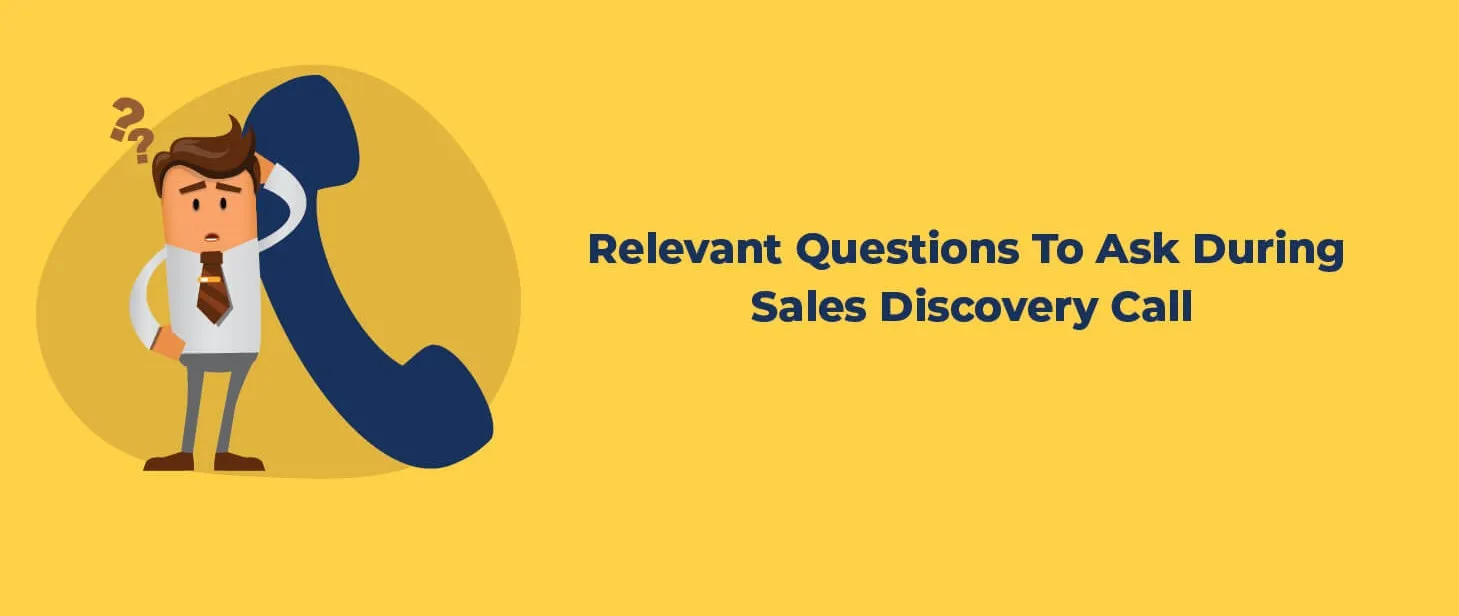
Structuring questions during a discovery call is pivotal to gaining comprehensive insights into your prospect's needs, challenges, and decision-making processes. Properly formulated questions not only drive the conversation forward but also build a foundation for a successful sales relationship.
1. Begin with Open-Ended Questions
Start your discovery call with open-ended questions that encourage the prospect to talk about their current situation and objectives.
Example: "Can you describe some of the challenges you're currently facing in your role?"
These questions allow the prospect to share detailed information, providing you with a broader understanding of their needs.
2. Transition to Specific Discovery Questions:
Once you have a general understanding, shift to more specific questions to dive deeper into particular areas of interest or concern.
Example: "What specific features are you looking for in a solution to help address these challenges?"
This helps you identify exactly what the prospect values and how your solution might align with their expectations.
3. Incorporate Qualifying Questions:
Integrate qualifying questions to assess whether the prospect fits the ideal customer profile for your product or service.
Example: "What is your timeline for implementing a new solution?"
Qualifying questions help you determine if there is a practical opportunity to pursue, focusing on timelines, budget, and authority.
4. Explore Decision-Making Process:
Understanding who is involved in the decision-making process and how decisions are made is crucial.
Example: "Can you walk me through your typical decision-making process for purchases like this?"
This allows you to tailor your approach to the specific dynamics and hierarchy within the prospect's company.
5. Discuss Budget:
Directly addressing the budget helps to align your offerings with the prospect's financial constraints.
Example: "What budget have you allocated for this type of solution?"
Knowing the budget upfront saves time by ensuring the solutions discussed are financially feasible for the prospect.
6. Conclude with Commitment Questions:
End the call by gauging the prospect's commitment and next steps to maintain momentum.
Example: "What would be the next steps if you decide to proceed with our solution?"
Commitment questions help clarify the prospect's intentions and establish clear next steps, reducing the likelihood of the sales process stalling.
Final Thoughts on Sales Discovery Call Questions
Incorporating the 100 discovery sales questions into your strategy ensures that every sales interaction, especially during a great discovery call, is leveraged to its full potential.
By asking the right questions, sales reps can better qualify leads, tailor their pitches precisely, and build stronger relationships with prospects. This focused approach not only streamlines the sales process but also enhances the overall effectiveness of sales efforts, leading to more successful outcomes and sustained customer relationships.
Further Reading
To deepen your understanding of sales strategies and continue refining your sales process, we recommend exploring the following resources. These articles provide valuable insights and practical tips to further enhance your sales team's effectiveness:
- Generating B2B Sales Leads: The Blueprint for Accelerating Your Business Growth: Unlock the secrets to generating high-quality B2B sales leads with effective strategies that promise to accelerate your business growth. Read more.
- Mapping Sales: A Comprehensive Guide: Understand the importance of mapping sales processes in your organization. This article offers a step-by-step guide on how to effectively map out your sales processes, enhancing your team's clarity and efficiency. Read more.
- 7 Stages of the Sales Cycle Revealed: From Prospecting to Referrals: Gain a deeper insight into each stage of the sales cycle with this comprehensive guide. From initial prospecting to securing referrals, learn how to navigate through each stage to ensure a smooth sales process and improve your conversion rates. Read more.
- Marketing Qualified Lead (MQL): What It Is and Why It Matters: Delve into the concept of Marketing Qualified Leads (MQLs) and understand their critical role in the sales process. This article explains how to identify MQLs and the best practices for nurturing them towards becoming sales-ready leads. Read more.
- The Buyer's Journey in B2B: A Detailed Exploration: Explore the intricacies of the buyer's journey in the B2B context. Understanding the steps your potential customers take from awareness to decision can significantly impact your sales strategy and success. Read more.
These resources offer comprehensive guides and strategies to refine every aspect of your sales process, from initial prospecting to closing deals. Delve into these articles to build on the foundations of your chosen sales methodology and drive sustained success for your sales team.





